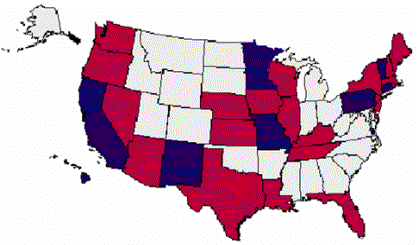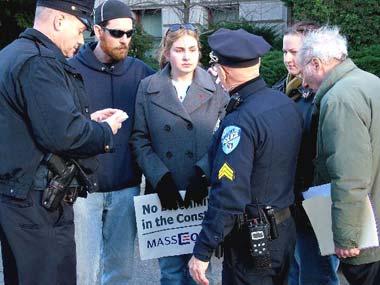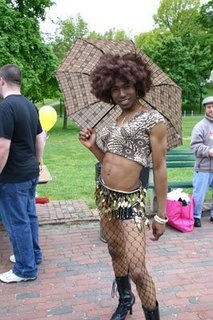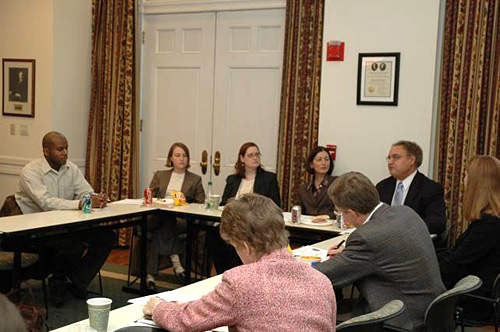| |||||||||||
| |||||||||||
Hate Crime Laws: Twenty-Nine states and the District of Columbia have hate crime laws that protect people based on sexual orientation. Of these, only seven and DC include protections based on gender identity or expression. |
 |
Transgender Inclusive Hate Crime Laws |
Massachusetts hate crimes laws: a broad brush to silence criticism
Sections 1&2
The clear intention of Bill H1722 is to silence any opposition to the mainstreaming of transgenderism and transsexuality. Sections 1 and 2 add “gender identity and expression” to the existing state “hate crimes” statutes:
SECTION 1. Section 32 of chapter 22C of the General Laws, as appearing in the 2004 Official Edition, is hereby amended by striking out the third paragraph and inserting in place thereof the following paragraph:--
"Hate crime", any criminal act coupled with overt actions motivated by bigotry and bias including, but not limited to, a threatened, attempted or completed overt act motivated at least in part by racial, religious, ethnic, handicap, gender [here meaning male or female], sexual orientation, or gender identity or expression prejudice, or which otherwise deprives another person of his constitutional rights by threats, intimidation or coercion, or which seek to interfere with or disrupt a person's exercise of constitutional rights through harassment or intimidation. Hate crime shall also include, but not be limited to, acts that constitute violations of sections thirty-seven and thirty-nine of chapter two hundred and sixty-five, section one hundred and twenty-seven A of chapter two hundred and sixty-six and chapter two hundred and seventy-two. [emphasis added]
“Any criminal act” could include a simple assault, which could be touching or shoving someone. The terms bigotry, bias, prejudice, intimidation, coercion, harassment are left undefined. (We think we know what they mean, but we thought that about the word “marriage” too.) How will it be determined if the criminal actions are “motivated by bigotry and bias”? These questions are not answered in the existing statutes or new bill text, and this omission opens the door to judicial abuse. The statute also does not limit “hate crimes” to those enumerated here. One statute cited, Ch. 265, section 37, which guarantees every person’s rights under the state and federal constitutions, should protect every citizen’s constitutional right to free speech and religion on whatever subject, including homosexuality and transgenderism. But the GLBT radicals intend to punish more harshly a criminal who also expresses disapproval of their behaviors.
An innocent victim of the "hate speech" movement
The attempt in 2006-2007 to convict a pro-family activist for assault and a civil rights violation (which could have been a “hate crime” since sexual orientation was at issue in the event) -- when all he did was to lead an out-of-control disrupter away from a permitted pro-marriage event in Worcester by guiding her away with just one hand -- illustrates how the activists want to use the “hate crimes” statutes to shut down all who oppose them in public speech.
From the MassResistance report (October 2007):
On Saturday morning, Dec. 16, 2006, Larry Cirignano was helping run a peaceful pro-traditional marriage rally on the steps of Worcester City Hall. They had a legal permit to use the area for the rally. But dozens of homosexual activists converged on the area in order to disrupt it, many holding signs and screaming vulgar chants and obscenities. Several Worcester police officers were at the scene, but - as they testified at the trial - they made no efforts to keep the homosexual activists from going into the rally area to disrupt it. All the police did, as they admitted, was keep the sidewalk clear for passersby.
During one of the speeches, Sarah Loy, and ACLU board member and pro-homosexual "marriage" activist, came in and stood in front of the podium, facing the crowd. She held a homosexual-marriage sign and taunted the crowd, chanting. Several people asked her to leave, but she refused. So Larry (who has been trained by the Secret Service in crowd control for these types of events) walked up and gently led her to the side using one arm, carrying his valise in the other. When Loy reached the edge of the crowd, Larry began walking away. But as Loy made her way through the crowd she fell to the ground. Then she started screaming and chanting "That's what hate does!" and proclaimed that Larry had pushed her to the ground.
The police talked with Loy and her cohorts and later charged Larry with assault and battery. (Interestingly, they only talked to "witnesses" from the pro-homosexual side.) Newspapers across the state reported that Larry had run up, grabbed Loy with both hands, and threw her to the ground. Later, District Attorney Joseph Early, Jr. and the City of Worcester determined that Loy had a "constitutional right" to be where she was and filed a civil rights charge against Larry, for allegedly violating Loy's First Amendment rights of free speech….Disrupting a public meeting is against Massachusetts Law. However, the judge did not allow the jury to be given that information. But in the trial, the case against Larry completely fell apart. First, after listening to the District Attorney's twisted reasoning about the First Amendment violation, the judge threw out the civil rights charge….
Then, after several witnesses testified, it became clear that Loy had not been pushed by Larry at all. Instead, Loy had tripped over the foot of a thirteen-year-old girl standing in the crowd, after Larry had walked away.… Even Loy's claim that she had hit her head on the ground was debunked by witnesses who testified they saw her land on her buttocks, break her fall with her hand, look around for a second, and then l lie down in a fetal position and scream.
 |
Massachusetts ACLU Board Member Sarah Loy falsely accused a pro-family activist of assault and violation of her civil rights after she disrupted a permitted rally opposing homosexual “marriage”. The defendant was acquitted, but we can expect to see more such provocations in an attempt to silence voices for traditional values. (Photo: Indymedia.) |
The GLBT activists, working in concert with the ACLU, were not only hoping to convict Cirignano of assault, but violations of the disrupter’s constitutional rights. Hate crimes punishments for both these crimes would apply if “sexual orientation” or “gender identity or expression” is supposedly a factor. In this case, how would Cirignano’s bias or motivation by bigotry be proven? Simply by the fact that he opposed homosexual “marriage”? (The disrupters were chanting that their opponents were all “bigots” -- so they must be bigots.)
Is anyone safe from "hate crimes" laws?
This section could be used to convict anyone who challenges a transsexual in any “public accommodation” in Massachusetts, should H1722 pass:
Chapter 265: Section 37. Violations of constitutional rights; punishment
Section 37. No person, whether or not acting under color of law, shall by force or threat of force, willfully injure, intimidate or interfere with, or attempt to injure, intimidate or interfere with, or oppress or threaten any other person in the free exercise or enjoyment of any right or privilege secured to him by the constitution or laws of the commonwealth or by the constitution or laws of the United States. Any person convicted of violating this provision shall be fined not more than one thousand dollars or imprisoned not more than one year or both; and if bodily injury results, shall be punished by a fine of not more than ten thousand dollars or by imprisonment for not more than ten years, or both.
“Hate crimes” in Massachusetts law also includes Ch. 265, section 39:
“whoever commits an assault or a battery upon a person or damages the real or personal property of a person with the intent to intimidate such person, or damages to real or personal property of a person . . .” [emphasis added]
It is apparent at many recent rallies surrounding the Massachusetts Constitutional Conventions and other controversial events that homosexual activists are looking for occasions to bring charges, taunting people in the hopes of provoking a chargeable response. How will “intent to intimidate” be determined? Could simply reaching out to or gently touching another person be called a “threat of force” – because the “victim” says so? And if you tell a homosexual or transsexual that they don’t really have a constitutional right to marry, would a Massachusetts court agree that you were “oppressing” or “intimidating” him in his “free exercise or enjoyment” of his constitutional rights (given the Goodridge marriage ruling by the Massachusetts SJC)? Could your speech alone be considered a “threat of force”?
“Criminal acts” can also include “criminal harassment” which is loosely defined, and largely dependent on the “victim’s” perceptions (see Ch. 265, section 43A):
Whoever willfully and maliciously engages in a knowing pattern of conduct or series of acts over a period of time directed at a specific person, which seriously alarms that person and would cause a reasonable person to suffer substantial emotional distress, shall be guilty of the crime of criminal harassment and shall be punished by imprisonment in a house of correction for not more than two and one-half years or by a fine of not more than $1,000, or by both such fine and imprisonment. Such conduct or acts described in this paragraph shall include, but not be limited to, conduct or acts conducted by mail or by use of a telephonic or telecommunication device including, but not limited to, electronic mail, internet communications or facsimile communications.
Could that be used to refer to a pastor’s sermons, as heard “over a period of time” by a psychologically disturbed transgender (or homosexual) individual, who feels he’s being singled out in the congregation? Sermons saying that homosexual or transsexual “marriage” or parenting is morally wrong, or that we must respect our God-given bodies, may “alarm” a homosexual or transgender person who disagrees, who could then charge that the pastor is causing him “to suffer substantial emotional distress.” Many pastors have already shown undue caution (due to IRS regulations) on issues such as abortion or homosexuality. H1722 as law could further silence traditional voices, not only religious leaders but writers or media figures who speak out against homosexual or transsexual “marriage” or “transgender rights,” and refer to the individual activists pushing these.
Massachusetts Commission Against Discrimination (MCAD) Sections 8-10
MCAD has blanket authority to “investigate and pass upon complaints of unlawful practices” and discrimination in all areas, including public accommodations and employment. It almost functions as a second court system, or a “human rights tribunal.” It is independent and unaccountable and will only become more powerful over time.
|
The Boston Bar Assoc. Labor & Employment Law Section recently invited a group from the Massachusetts Commission Against Discrimination to discuss MCAD’s objectives for 2006: (from right to left) John Lozada, Chief of Enforcement; Betty Waxman, Hearing Officer; Caitlin Sheehan, Commission Counsel; and Jessica Thrall and Keith Parrett, MCAD Investigators. (Photo & caption: Boston Bar Association.) |
Totalitarian enforcement by tribunal - no court trial or jury
Bill H1722 would extend MCAD’s authority to cases involving “gender identity and expression” (Section 8). It also mandates including commission members who represent this new diversity category, thereby ensuring that rulings will favor transgender plaintiffs (Section 9). (H1722 would amend subsections 8 & 9 of Ch. 151B, section 3.) Created under Ch. 6, section 56, that statute defines MCAD’s duties:
6. To receive, investigate and pass upon complaints of unlawful practices, as hereinafter defined, alleging discrimination because of the race, color, religious creed, national origin, sex, sexual orientation, which shall not include persons whose sexual orientation involves minor children as the sex object, age, genetic information, ancestry, children, marital status, veteran status or membership in the armed services, the receiving of public assistance, or handicap of any person alleging to be a qualified handicapped person. The term “sexual orientation” shall mean having an orientation for or being identified as having an orientation for heterosexuality, bisexuality, or homosexuality. The commission through its chairman may appoint a single commissioner to hold public hearings, as hereinafter provided, and to otherwise act on its behalf in connection therewith; provided, however, that a person aggrieved by the decision of said single commissioner may, within ten days of said decision, file an appeal for rehearing or review by the commission.
7. To hold hearings, subpoena witnesses, compel their attendance, administer oaths, take the testimony of any person under oath, and in connection therewith, to require the production for examination of any books or papers relating to any matter under investigation or in question before the commission. The commission may make rules as to the issuance of subpoenas by individual commissioners.
No person shall be excused from attending and testifying or from producing books, records, correspondence, documents or other evidence in obedience to the subpoena of the commission, on the ground that the testimony or evidence required of him may tend to incriminate him or subject him to a penalty or forfeiture; but no individual shall be prosecuted or subjected to any penalty or forfeiture for or on account of any transaction, matter or thing concerning which he is compelled, after having claimed his privilege against self-incrimination, to testify or produce evidence, except that such individual so testifying shall not be exempt from prosecution and punishment for perjury committed in so testifying.
Section 10 of H1722 would empower MCAD to become a propaganda arm for the transgender revolution: They are charged with publishing “results of investigations [to] promote good will and minimize or eliminate discrimination.”
A prominent employment law firm wrote in 1999: “MCAD has changed its focus. It no longer views itself as merely a quasi-judicial agency that adjudicates discrimination claims, but rather as an active enforcement agency intent upon the elimination of all unlawful discrimination.” Another law firm’s Employment Law Advisor outlines MCAD procedures, confirming that the burdens on the Massachusetts business community are growing:
The Massachusetts Commission Against Discrimination (“MCAD”) is the first place many disgruntled Massachusetts employees turn when they believe they have a discrimination or harassment claim against their employer. These claims can result in significant back pay, emotional distress, and attorneys’ fees awards…. Requiring employers to produce detailed information and specific documents at the outset of the case is a significant change in the agency’s approach to investigating complaints. In order to fare well in this new environment, an employer must be ready to put its best foot forward from the moment it receives the complaint. No longer may an employer file just a brief position statement and depend upon later proceedings to fill in the blanks; instead, the employer must conduct a thorough investigation at the beginning of the case. Because the employer must produce more information and documents right away, it must be sure to develop a theory of defense that is consistent with the many questions being asked by the MCAD, and produce interrogatory responses and documents which support this theory…. if the employer does not raise defenses in its position statement, it may waive the right to them….
The need for employers to file a thorough and convincing set of initial pleadings is heightened further by the MCAD’s recent decision to eliminate investigative conferences in most cases. In the past, after the employer filed its position statement, the MCAD would conduct an investigative conference at which both parties (and their attorneys, if represented by counsel) would appear. The investigative conference gave the MCAD and the parties a chance to size each other up, and, in many cases, allowed a well prepared employer’s counsel to press the strengths of their position and expose the weaknesses of the complainant’s case.
Without this opportunity (which we believed in most cases favored our clients over the complainants), the MCAD will have only the parties’ paper submissions to rely upon when deciding whether there is probable cause that discrimination occurred. Furthermore, the lack of an investigative conference will make it more challenging for employers to defend themselves, as employers will have only the complainant’s charge (which may be quite brief and devoid of detail) to rely upon in determining what, precisely, the complainant is alleging.
The dangers to employers involved in MCAD cases remain significant — although the MCAD cannot impose punitive damages, it has historically awarded large amounts of emotional distress damages to prevailing complainants….
If MCAD no longer sees the complainant and the defendant company in a personal conference, the extra impact of a transgender’s presentation and its effect on the day-to-day reality of company’s functioning will be less of a factor. And how will a business know how to defend itself in advance if charged with discrimination on the basis of “gender identity or expression,” when this new category of discrimination is not even properly defined in the law? The years immediately following passage of such a law are ripe for precedent-setting rulings – with the employers left totally out in the cold on how to defend themselves.
There is no possibility of appeal of an MCAD ruling. This is truly government by unaccountable tribunal. The Massachusetts Supreme Judicial Court so ruled in May 2004, according to the Boston Globe:
In a finding that could significantly impact employers throughout the state, the Massachusetts Supreme Judicial Court this month overruled its 1997 decision allowing employers to seek a jury trial following an adverse decision from the Massachusetts Commission Against Discrimination, the state's antidiscrimination agency. The high court said it erred seven years ago when it ruled that the Massachusetts constitution gave employers the right to seek redress before a jury. In its May 6 decision, the court said the practice undermined the MCAD. The court also reaffirmed the right of a complainant to withdraw a charge from the agency after 90 days so as to bring action in court. Dorca Gomez, chairwoman of the MCAD, said the decision was a victory for employees and the state agency, which handles about 4,000 bias charges a year. Boston Globe reporter Diane Lewis talked to Gomez about the ruling and the commission:
Q: Why did the Supreme Judicial Court conclude that seeking redress through a jury trial was detrimental to the MCAD?
A: Allowing respondents to have a jury trial took a lot of power out of the MCAD's decisions. No matter what it ruled, the respondents could say, 'Well, I object. I am going before a jury.' "
Q: Given that, why did the court rule in favor of the jury trial in 1997?
A: In 1997, the Supreme Judicial Court did not quite understand the role of the MCAD, and it determined that if a complainant has a right to jury trial, so should the respondent. So, the SJC asked the Legislature to change the law so that employers could seek redress before a jury.
Q: Shouldn't employers have the same access to jury trials as employees?
This is not an equal protection issue. In other words, the employee is not equally situated, and is not on the same level as the employer. The employer has more resources. The court found that there was no equal protection problem because the complainant only gets the right to one hearing, and must choose between a hearing at the commission or a trial in court. If a complainant decides to go to court, the respondent also gets a trial. The court said both get the opportunity to have the same type of process.
Q: Did the justices review any other key issues?
They wanted to know how and where MCAD cases should be heard, whether respondents should be permitted a trial before a jury or a judge. They also looked at whether their original decision should be overruled, or whether it should remain the same.
Q: Will complaints go up because of the decision?
Yes, we will see an increase in cases.
Parties that have the financial resources to remove cases from the MCAD or feel that, from a legal standpoint, it would be best to have the case heard in court, will continue to do that. But people who feared that they would have to go through two different hearings, one at the MCAD and one before a jury, will stay.Q: What kinds of discrimination complaints are handled by the MCAD?
The top five categories are race, disability, sex, age, or national origin. We also protect against employment discrimination because of arrest records or sexual orientation, discrimination in housing, public accommodations, against veterans, and because of genetic makeup.
Welcome to the People’s Republic of Massachusetts.
Copyright © 2008 MassResistance
| Top |



